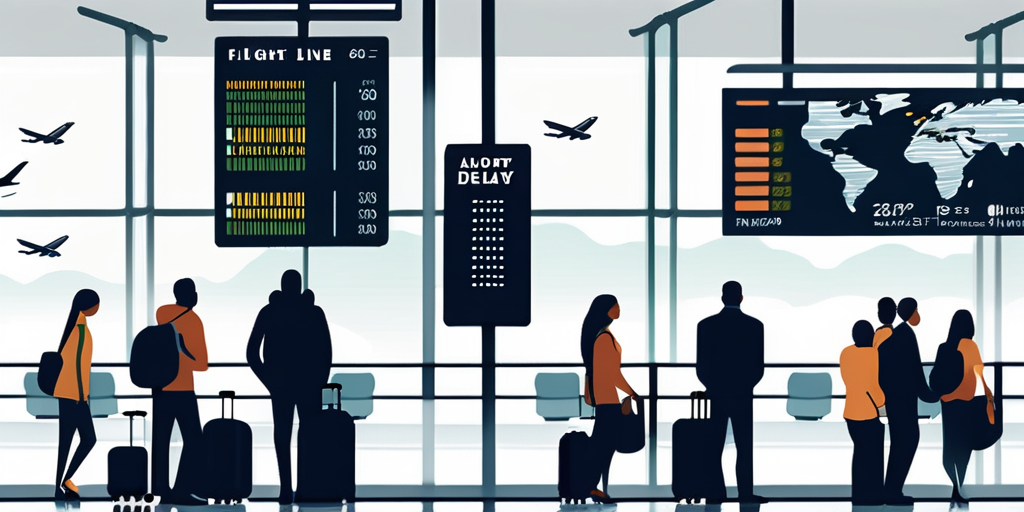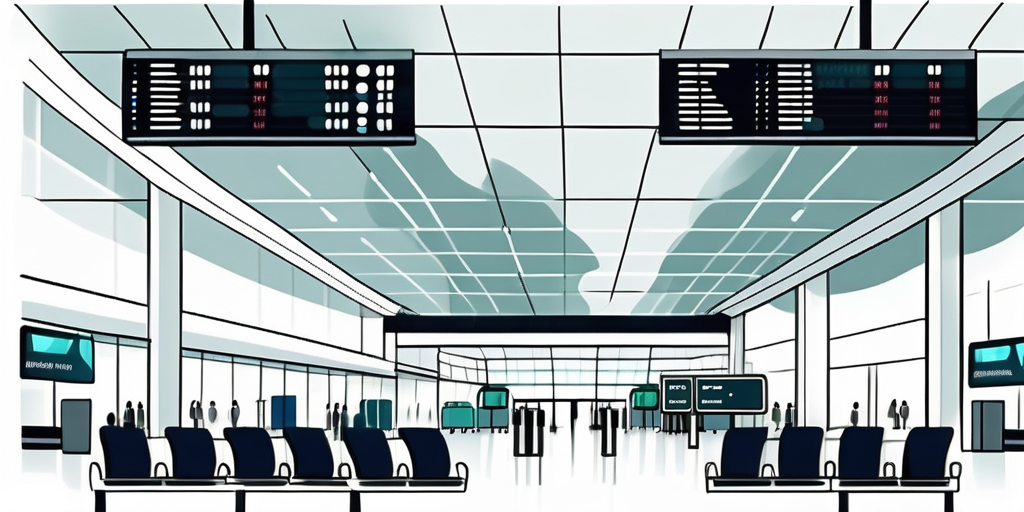Should I Still Go to the Airport If My Flight Is Delayed?
Unsure if you should still head to the airport when your flight is delayed? Get expert advice and make the right decision for your travel plans.
Flight delays can be quite frustrating for travelers. It can disrupt your schedule, cause inconvenience, and even lead to missed connections or important events. However, depending on the circumstances, it may still be necessary to go to the airport even if your flight is delayed. In this article, we will explore the different aspects of flight delays and help you make an informed decision about whether or not you should still go to the airport.
Understanding Flight Delays
Flight delays are a common occurrence in the travel industry. They can be caused by various factors, ranging from technical issues with the aircraft to weather conditions. Understanding the types of flight delays can help you better navigate through such situations.
Types of Flight Delays
There are primarily two types of flight delays – avoidable and unavoidable delays. Avoidable delays are those that could have been prevented by the airline, such as maintenance issues or scheduling errors. On the other hand, unavoidable delays are beyond the control of the airline, such as extreme weather conditions or air traffic congestion.
Common Causes of Flight Delays
Several factors contribute to flight delays. Some of the most common causes include mechanical problems, crew scheduling issues, airport congestion, and weather-related disruptions. Understanding these common causes can give you insight into the likelihood of your flight being delayed.
Let's delve deeper into each of these common causes to gain a better understanding of how they can impact your travel plans.
Firstly, mechanical problems can arise unexpectedly and require immediate attention. These issues can range from minor glitches to more significant malfunctions that need extensive repairs. Airlines prioritize passenger safety, so any mechanical issue must be resolved before the aircraft can take off. While these delays can be frustrating, it's crucial to remember that they are in place to ensure your safety.
Secondly, crew scheduling issues can also lead to flight delays. Airlines have to carefully manage their crew members' schedules to comply with regulations and ensure that they are well-rested. However, unforeseen circumstances such as illness or last-minute changes can disrupt these schedules, resulting in delays. Airlines strive to find replacements quickly, but sometimes it can take time to rearrange the crew, leading to a delay in departure.
Airport congestion is another significant factor that can cause flight delays. As air travel continues to grow in popularity, airports around the world are experiencing increased traffic. This congestion can lead to longer taxi times, delayed takeoffs, and extended waiting periods at the gates. While airports are constantly working on improving efficiency, the sheer volume of flights can sometimes lead to unavoidable delays.
Lastly, weather-related disruptions are a common cause of flight delays. Adverse weather conditions, such as thunderstorms, heavy snowfall, or strong winds, can make it unsafe for aircraft to take off or land. Airlines closely monitor weather forecasts and work with air traffic control to ensure the safety of their passengers. While these delays can be frustrating, they are necessary to protect passengers and crew from potential hazards.
By understanding these common causes of flight delays, you can better prepare yourself for potential disruptions and plan accordingly. Remember to stay informed about your flight status, have a contingency plan in place, and maintain patience during unforeseen circumstances.
Extraordinary circumstances can also be a cause of delays or cancellation of flights.
Extraordinary circumstances refer to events that are beyond the control of the airline and are not typically part of their normal operations. These events can include severe weather conditions, natural disasters, air traffic control restrictions, political unrest, security threats, and strikes among others. Due to the unforeseen nature of these circumstances, airlines may be unable to conduct flights as scheduled, leading to delays and disruptions for passengers.
The Impact of Flight Delays on Your Travel Plans
When your flight is delayed, it can have a significant impact on your travel plans, especially if you have connecting flights or time-sensitive commitments upon arrival. Ignoring flight delays can lead to potential consequences that may further complicate your journey.

Potential Consequences of Ignoring Flight Delays
One potential consequence of ignoring flight delays is missing your connecting flight. If you have a tight connection, it's crucial to reassess your options and take necessary actions to avoid being stranded at the airport. Additionally, if you have important commitments upon arrival, such as a business meeting or a special event, disregarding flight delays can put these engagements at risk.
How Airlines Handle Delayed Flights
Airlines have specific protocols in place to handle delayed flights. Understanding how they handle such situations can help you make an informed decision about whether or not to go to the airport. In most cases, airlines will provide updated information about the delay and offer rebooking options if necessary. However, the level of assistance may vary depending on the circumstances and the airline's policies.
When it comes to delayed flights, it's important to note that airlines prioritize passenger safety above all else. They have a responsibility to ensure that all necessary maintenance and repairs are conducted before allowing the aircraft to take off. This means that sometimes delays are unavoidable, as the airline must prioritize the safety of its passengers and crew.
During a flight delay, airlines strive to keep passengers informed and comfortable. They will often provide updates on the estimated departure time and any changes to the flight schedule. In some cases, airlines may offer compensation or amenities to passengers affected by the delay, such as meal vouchers or access to airport lounges.
It's also worth mentioning that airlines have dedicated teams that work tirelessly to minimize the impact of delays on passengers. These teams are responsible for coordinating alternative travel arrangements, such as rebooking passengers on other flights or arranging overnight accommodations if necessary. They understand the frustration and inconvenience that flight delays can cause, and they do their best to assist passengers in navigating through these challenges.
Deciding Whether to Go to the Airport
When your flight is delayed, it's important to carefully consider various factors before deciding whether to go to the airport or not. Making an informed decision can save you time, effort, and potential stress.
 Let's dive deeper into the factors that should be taken into account when deciding whether to go to the airport during a flight delay. By evaluating these factors, you can assess the situation more effectively and make the best decision for your travel plans.
Let's dive deeper into the factors that should be taken into account when deciding whether to go to the airport during a flight delay. By evaluating these factors, you can assess the situation more effectively and make the best decision for your travel plans.
Factors to Consider
One of the key factors to consider is the reason for the delay. Is it due to weather conditions, technical issues, or other unforeseen circumstances? Understanding the cause of the delay can give you insights into the likelihood of it being resolved quickly or potentially leading to further complications.
Another important factor is the estimated duration of the delay. Is it a minor delay that will only last a short while, or is it a significant delay that could potentially disrupt your entire travel schedule? Knowing the estimated duration can help you weigh the pros and cons of going to the airport.
Consider the impact of the delay on your travel plans. Will missing your flight have serious consequences, such as missing an important meeting or a connecting flight? Assessing the potential impact will help you prioritize your decision-making process.
Lastly, explore the alternatives available to you. Are there other flights you can book? Can you contact your airline for assistance in rebooking or finding alternative routes? Understanding your options can provide you with a clearer picture of the choices you have.
Assessing Your Options
When faced with a flight delay, it's essential to assess all your options before making a decision. Take the time to check for alternative flights that may still be available. Contact your airline's customer service for assistance, as they may have valuable information and solutions to offer.
Consider available transportation options. Is there a train or bus that can get you to your destination? Are there car rental services you can utilize? Exploring these alternatives can open up new possibilities and potentially save you from unnecessary stress.
Adjusting your schedule accordingly is another aspect to consider. Can you reschedule any meetings or appointments if needed? Are there accommodations available at your destination in case you need to stay overnight? Being flexible and adaptable can help you navigate through unexpected delays.
By thoroughly evaluating these factors and assessing your options, you can make an informed decision when faced with a flight delay. Remember, it's essential to prioritize your safety, convenience, and overall travel experience.
Communication with Your Airline During Delays
During a flight delay, communication with your airline is pivotal. Staying informed and actively engaging with the airline can help you navigate through the situation more effectively.

Turn on the flight delay notifications
Signing up for flight delay notifications is a proactive way for travelers to stay informed about any changes to their flight schedules. Here's how it works:
Notification Options: Airlines typically offer various notification methods, including email, text message (SMS), or push notifications through their mobile apps. Passengers can choose their preferred method or sign up for multiple notification channels for redundancy.
Flight Status Updates: Once signed up, passengers will receive automatic updates about their flight status, including delays, cancellations, gate changes, and boarding announcements. These notifications are usually sent in real-time or shortly after any changes occur.
Customization: Some notification systems allow passengers to customize their preferences, such as the types of updates they receive and the timing of notifications. This customization ensures that passengers receive relevant information tailored to their needs.
Early Awareness: By signing up for notifications, passengers can receive early alerts about flight delays, giving them more time to adjust their travel plans accordingly. This early awareness can be valuable for making alternative arrangements or minimizing inconvenience.
Convenience: Flight delay notifications provide convenience and peace of mind for travelers, allowing them to stay informed without constantly checking flight status manually. This frees up time and reduces stress, particularly during busy travel periods.
Overall, signing up for flight delay notifications is a simple yet effective way for travelers to stay informed and prepared for any changes to their flight schedules, ensuring a smoother travel experience.
Best Ways to Contact Your Airline
When you need to reach out to your airline during a flight delay, there are various channels available. These include calling the airline's customer service hotline, reaching out to them through social media platforms, or using their online chat support service. It's important to choose the channel that provides the quickest response time and solves your query most effectively.
How to Manage Flight Delays
While flight delays can be frustrating, there are ways to manage them effectively to minimize their impact on your travel experience. By following some useful tips and being aware of your rights, you can make the most out of a challenging situation.
Tips for Dealing with Flight Delays
Here are some practical tips to help you deal with flight delays:
- Stay calm and patient: Remember that flight delays are beyond your control.
- Seek assistance: Approach airline staff for information and possible solutions.
- Stay connected: Keep your phone and other devices charged to stay updated.
- Explore airport amenities: Utilize airport facilities to make your wait more comfortable.
- Know your rights: Familiarize yourself with passenger rights to ensure fair treatment.
Your Rights as a Passenger During Delays
Passenger rights during flight delays can vary depending on the jurisdiction and the specific circumstances of the delay. However, in general, airlines are obligated to provide certain accommodations, such as meals, accommodation, and compensation, depending on the duration of the delay and the applicable regulations. Knowing your rights can help you assert them if necessary.
In conclusion, whether or not you should still go to the airport if your flight is delayed depends on various factors. Understanding flight delays, assessing the impact on your travel plans, staying informed through effective communication with your airline, and knowing how to manage flight delays will help you make the best decision. By being proactive and informed, you can navigate through flight delays more efficiently and minimize any potential disruptions to your travel experience.
What To Do If You Miss Your Delayed Flight
Contact the Airline: Notify the airline as soon as possible about your situation. They may be able to assist you with rebooking on a later flight, although fees or fare differences may apply.
Check Rebooking Options: Ask the airline about available alternative flights and rebooking options. Consider factors such as departure times, layovers, and seat availability when choosing a new flight.
Consider Standby: If there are no immediate available flights, inquire about standby options. You may be able to standby for an earlier flight on the same day, depending on seat availability.
Assess Additional Costs: Be aware of any additional costs associated with rebooking, such as change fees or fare differences. Some airlines may waive fees for missed connections or delays caused by the airline.
Check Travel Insurance: If you have travel insurance, review your policy to see if it covers missed flights due to delays. You may be eligible for reimbursement of additional expenses incurred as a result of missing your flight.
Arrange Accommodation if Necessary: If you need to stay overnight due to missing your flight, arrange accommodation as needed. Some airlines may provide assistance or compensation for overnight stays in certain circumstances.
Stay Informed: Keep yourself informed about any updates or changes to your travel plans. Stay in contact with the airline and monitor your flight status for any further developments.
It's essential to remain calm and flexible when dealing with missed flights due to delays. Communicate with the airline, explore your options, and make arrangements to continue your journey as smoothly as possible.
Get the Compensation You Deserve with ClaimCompass
Flight delays can be more than just an inconvenience—they could mean money back in your pocket. If you've experienced a delay, ClaimCompass is here to help. We specialize in securing up to 600€ in compensation for disrupted flights, in accordance with EU Regulation 261/2004.
With our free online calculator, discover how much money you are entitled of and claim it with our service.
Don't let the stress of delays go uncompensated. Simply Submit a claim with us, and we'll handle everything from submitting it to the airline to legal proceedings if necessary. With our no-win, no-fee policy, you have nothing to lose. Check your eligibility for free today and let us help you claim what you're owed.
Can I arrive at the airport later if my flight is delayed?
If your flight is delayed, you may consider adjusting your arrival time at the airport accordingly, but it's essential to consider a few factors:
- Updated Flight Information: Before deciding to arrive later at the airport, make sure to check for any updates on your flight status. Flight delays can change, and arriving too late could result in missing the flight if it departs earlier than expected.
- Airport Policies: Some airports have specific guidelines or recommendations regarding check-in and boarding times, especially for international flights. Ensure that you comply with any requirements set by the airport and the airline.
- Security and Check-In: Even if your flight is delayed, you'll still need to go through security screening and check-in processes, which can take time, especially during peak travel periods.
- Gate Changes: Gate assignments can change, particularly for delayed flights. Arriving later may mean you miss important announcements about gate changes or boarding procedures.
- Personal Considerations: Consider your own comfort and peace of mind. Arriving at the airport with sufficient time allows you to handle any unforeseen circumstances calmly and reduces stress associated with rushing.
In summary, while arriving later at the airport might be feasible in some cases of flight delay, it's crucial to stay informed about your flight status, adhere to airport and airline guidelines, and consider personal factors before making a decision.
What to do if flight is delayed by 2 hours?
For a delay at departure of at least 2 hours, the airline must provide you with a meal (or meal voucher), refreshments, access to wi-fi, and 2 phone calls.
In general, for flights departing from or arriving at European Union (EU) airports on EU carriers, compensation under EU Regulation 261/2004 typically begins for delays exceeding 3 hours, with some exceptions for shorter delays in specific circumstances. However, this regulation may not apply to flights outside the EU or operated by non-EU carriers.
Outside the EU, compensation policies may vary by airline and jurisdiction. Some airlines may offer compensation or amenities for shorter delays, while others may not provide compensation unless the delay exceeds a certain duration.
You can check our complete article about it .
How many hours of flight delay before compensation?
The duration for flight delay compensation varies depending on factors such as the airline, flight distance, and regulations in the departure and arrival locations. Check our article on flight delay compensation
In general:
- For flights departing from or arriving at European Union (EU) airports on EU carriers, compensation under EU Regulation 261/2004 typically begins for delays exceeding 3 hours, with some exceptions for shorter delays in specific circumstances.
- Outside the EU, compensation policies may vary by airline and jurisdiction. Some airlines may offer compensation for delays exceeding 2 or 3 hours, while others may have different criteria.
It's advisable for passengers to check the specific policies of the airline they are flying with and any relevant regulations governing their flight's departure and arrival locations to understand the eligibility criteria for compensation in case of a delay.
What if my flight is delayed by 1 day?
In the event of a delayed flight passengers may be entitled to certain amenities and assistance, depending on the Airlines. But specific entitlements can vary depending on the circumstances of the delay and the airline's policies. Here's a general overview of what passengers may be entitled to:
- Rebook passenger on same airline without any additional cost
- Rebook with one of their partner airline without any additional cost.
- A meal or meal voucher is garanteed for the flight delayed by 3 hours or more for their new flight.
- A complementary hotel accomodation for any passenger affected by an overnight cancellation
- A complementary ground transportation to and from hotel in case of an overnight cancellation.
